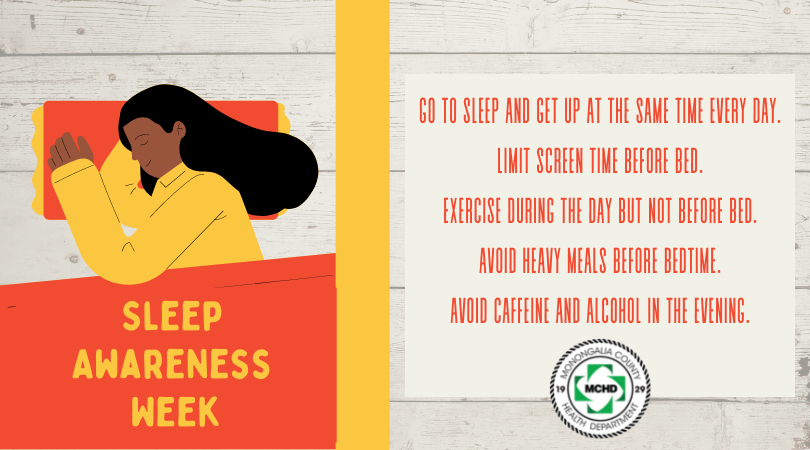Getting enough sleep helps keep you healthy

Mar. 11, 2020
By Matt Cimino
Getting enough sleep can ensure that you always wake up on the right side of the bed.
It also helps to keep you immune system strong, which is important as the seasonal flu season winds down and as the states that border West Virginia have all reported cases of COVID-19, or coronavirus.
It's a timely message made more so by the fact that it's National Sleep Awareness Week, as designated by the National Sleep Foundation.
For many people, hitting the hay is something you can only do after everything else in the day is done. The truth is that sleep is a vital part of human activity. We spend about one-third of our lives asleep. Without enough of it you can suffer from mental and physical exhaustion, mood swings and a weaker immune system. People who consistently lack proper sleep have also been found to be at a higher risk of developing cancer.
One of the most effective ways to improve your sleep is to make it into a schedule. Try to go to bed and wake up at the same times every day. Your body will naturally react by regulating its circadian rhythm, which is the brain’s natural on and off cycle. As you adapt to this change you will be able to “feel” when it’s time for some shut eye. A consistent sleep schedule is a crucial step towards waking up feeling like you are ready to take on the day.
Limiting exposure to technology is another way to improve sleep but it’s often the most neglected step. The blue light that is emitted from cell phone and computer screens inhibits melatonin production. Melatonin is the hormone that controls your body’s sleep and wake cycle. Without a sufficient level of this, you can be left feeling restless or alert.
Checking emails and social media involve a high level of cognitive energy. The more engaged your brain is with tasks the harder it will be to fall asleep. Try to cut off your screen time at least 30 minutes before going to bed. If possible, set your phone farther away in the bedroom rather than on your nightstand. Vibrations and other notification sounds can disturb you during deep sleep. Interrupting your body in this stage of rest can greatly affect the amount of quality sleep hours you get.
So how many hours of sleep do you really need? Well there are a few factors that change the numbers. Age is one of them. Teenagers up to age 17 and younger children require the most sleep. The National Sleep Foundation recommends that school age children (6-13) get about 9-11 hours, and teenagers (14-17) get around 8-10. Adults ages 18 and beyond should aim for a consistent 7-9 hours of shut-eye.
Level of physical activity also influences sleep. Those who exercise multiple times per week should aim for about an hour more sleep than typical recommendations. Consistently hitting those numbers is also very important. Regularly obtaining quality sleep time aids in exercise recovery, improved metabolism and immune health.
When I was in high school I struggled with proper sleep. As a school athlete year-round, rest was something my body really needed but did not always get. I would go to bed whenever I was done playing on my phone or when I finally finished homework that could have been done hours before. Rarely did I get in the ballpark of 7-9 hours. It wouldn’t be until after I graduated and went on to college that I finally started focusing on sleep. Here are some of the practices that work best for me and how they have changed my daily experiences:
• As mentioned earlier, make sleep a routine. I go to bed at 11:00pm and wake up at 7:00am. I have done this for a few years now, and I wake up without an alarm clock because my rhythm is solidified.
• Keep your bedroom comfortable. I prefer the temperature to be around 68 degrees or cooler. Don’t cheap out on bedding. After all, one-third of your life will be spent in bed! Comfort definitely helps me fall and stay asleep.
• Drink a little bit of water before going to bed. Waking up at 3am with cotton mouth is not a pleasant experience.
• Cut off technology use about 30 minutes before bed. This allows my mind to settle down and it makes sleep come easy.
• Manage your time. I look for good stopping points on my work that I can pick up on the next day.
My bedtime practices have significantly changed my daily mood and how I feel overall. Sleep should not just be thought of as the last part of the day. It is part of your daily obligations. Try gradually incorporating these steps and other methods that the National Sleep Foundation recommends into your life. You may be surprised how much of a difference it makes.
Matt Cimino is a public information intern at Monongalia County Health Department.